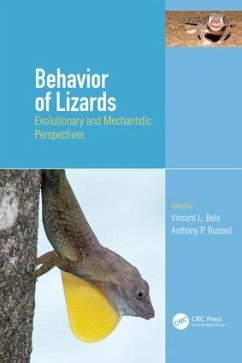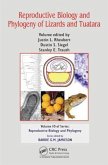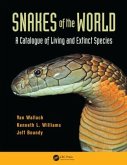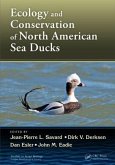Behavior of Lizards
Evolutionary and Mechanistic Perspectives
Herausgeber: Bels, Vincent; Russell, Anthony
Behavior of Lizards
Evolutionary and Mechanistic Perspectives
Herausgeber: Bels, Vincent; Russell, Anthony
- Gebundenes Buch
- Merkliste
- Auf die Merkliste
- Bewerten Bewerten
- Teilen
- Produkt teilen
- Produkterinnerung
- Produkterinnerung
Lizards are model organisms for a series of biological questions related to evolution, ecology, physiology, and morphology, studied at multiple spatial and temporal scales from individual to community levels. This book explains the mechanisms underlying the evolution and adaptation of these organisms.
Andere Kunden interessierten sich auch für
![Reproductive Biology and Phylogeny of Lizards and Tuatara Reproductive Biology and Phylogeny of Lizards and Tuatara]() Reproductive Biology and Phylogeny of Lizards and Tuatara266,99 €
Reproductive Biology and Phylogeny of Lizards and Tuatara266,99 €![Reproductive Biology and Phylogeny of Snakes Reproductive Biology and Phylogeny of Snakes]() Reproductive Biology and Phylogeny of Snakes256,99 €
Reproductive Biology and Phylogeny of Snakes256,99 €![Snakes of the World Snakes of the World]() Van WallachSnakes of the World277,99 €
Van WallachSnakes of the World277,99 €![Biology of Parrotfishes Biology of Parrotfishes]() Biology of Parrotfishes267,99 €
Biology of Parrotfishes267,99 €![Ecology and Conservation of North American Sea Ducks Ecology and Conservation of North American Sea Ducks]() Ecology and Conservation of North American Sea Ducks256,99 €
Ecology and Conservation of North American Sea Ducks256,99 €![Women in Field Biology Women in Field Biology]() Martha L CrumpWomen in Field Biology150,99 €
Martha L CrumpWomen in Field Biology150,99 €![Handbook of Australasian Biogeography Handbook of Australasian Biogeography]() Handbook of Australasian Biogeography256,99 €
Handbook of Australasian Biogeography256,99 €-
-
-
Lizards are model organisms for a series of biological questions related to evolution, ecology, physiology, and morphology, studied at multiple spatial and temporal scales from individual to community levels. This book explains the mechanisms underlying the evolution and adaptation of these organisms.
Produktdetails
- Produktdetails
- Verlag: CRC Press
- Seitenzahl: 426
- Erscheinungstermin: 14. Februar 2019
- Englisch
- Abmessung: 263mm x 187mm x 27mm
- Gewicht: 956g
- ISBN-13: 9781498782722
- ISBN-10: 1498782728
- Artikelnr.: 55364673
- Verlag: CRC Press
- Seitenzahl: 426
- Erscheinungstermin: 14. Februar 2019
- Englisch
- Abmessung: 263mm x 187mm x 27mm
- Gewicht: 956g
- ISBN-13: 9781498782722
- ISBN-10: 1498782728
- Artikelnr.: 55364673
Vincent Bels was born in Verviers, Belgium. He completed his PhD on the association between ethology and functional morphology at the University of Liège (Liège, Belgium). He used lizards as a key model to investigate the process of behavioral ritualization. He was Research Fellow and then Assistant Professor at the University of Liège (Belgium) for more than 10 years. Then he taught Biology, Zoology and Ecology, and developed an applied research program on feeding behavior in domestic animals at the Haute Ecole Condorcet and its associated Agronomic Centre (Belgium) for 10 years. He became Professor at the Muséum national d'Histoire naturelle (Paris, France) in 2005, and in this capacity served as joint director of a Mixed Research Unit (CNRS/MNHN, France) for over 7 years, as a member of the Scientific Committee of the Muséum national d'Histoire naturelle (Paris, France) for 8 years, and as a member of the Scientific Sections of the Centre National de Recherche Scientifique (CNRS, France) for a similar period. He has authored over 100 peer-reviewed articles, 10 chapters, and 6 books. The major theme of his research publications is the study of feeding, drinking and displaying in lizards, although he also published some papers on feeding and locomotion in fishes and birds. His main objective is the integration of behavioral and morphological studies into a comprehensive understanding of the "Form-Function" complex as it relates to the evolution of the trophic system of Vertebrates. Tony Russell was born in London, UK. He completed his BSc at the University of Exeter and his PhD at the University of London. Upon completion of his PhD he took up a short teaching appointment at the University of Botswana, Lesotho and Swaziland before beginning his work at the University of Calgary, during which time he served for six years as head of the Department of Biological Sciences. After 40 years of teaching various aspects of vertebrate biology and evolutionary biology he retired from his faculty position in 2013, but continues with his research. He has authored over 300 peer-reviewed scientific articles, 19 chapters, and three books. Although he has published on many groups of vertebrates, the continuing focus of his research has been the structure, function and evolution of geckos. His field work has taken him to Australia, New Zealand, many islands in the Eastern Caribbean, Namibia, and, most recently, Trinidad and Tobago. He has received recognition for his contributions including the NSERC 25 Years of Excellence Award, the Alberta Foundation for Environmental Excellence Award, and the University of Calgary Distinguished Faculty Award. Outside the University he has served as President of the Canadian Society of Zoologists, and President of the International Society of Vertebrate Morphologists.
Introduction. "Everyday" Behavior. Behavioral thermoregulation in lizards:
Strategies for achieving preferred temperature. Lizard locomotion:
relationships between behavior, performance, and function. Lizard foraging
- A Perspective Integrating Sensory Ecology and Life Histories. Predatory
behavior in lizards: strategies and mechanisms for catching prey.
Antipredator behavioral mechanisms: avoidance, deterrence, escape and
encounter. Social Behavior and Communication. The physiological control of
social behavior in lizards. Sensory processing in relation to signaling
behavior. Phylogeny and ontogeny of lizard display behavior. Behavioral
ecology of aggressive behavior in lizards. Stable social grouping in
lizards. Environmental impact, global change and behavior Hydroregulation -
a neglected behavioral response of lizards to climate change? Impact of
human-induced environmental changes on lizard behavior: insights from
urbanization
Strategies for achieving preferred temperature. Lizard locomotion:
relationships between behavior, performance, and function. Lizard foraging
- A Perspective Integrating Sensory Ecology and Life Histories. Predatory
behavior in lizards: strategies and mechanisms for catching prey.
Antipredator behavioral mechanisms: avoidance, deterrence, escape and
encounter. Social Behavior and Communication. The physiological control of
social behavior in lizards. Sensory processing in relation to signaling
behavior. Phylogeny and ontogeny of lizard display behavior. Behavioral
ecology of aggressive behavior in lizards. Stable social grouping in
lizards. Environmental impact, global change and behavior Hydroregulation -
a neglected behavioral response of lizards to climate change? Impact of
human-induced environmental changes on lizard behavior: insights from
urbanization
Introduction. "Everyday" Behavior. Behavioral thermoregulation in lizards:
Strategies for achieving preferred temperature. Lizard locomotion:
relationships between behavior, performance, and function. Lizard foraging
- A Perspective Integrating Sensory Ecology and Life Histories. Predatory
behavior in lizards: strategies and mechanisms for catching prey.
Antipredator behavioral mechanisms: avoidance, deterrence, escape and
encounter. Social Behavior and Communication. The physiological control of
social behavior in lizards. Sensory processing in relation to signaling
behavior. Phylogeny and ontogeny of lizard display behavior. Behavioral
ecology of aggressive behavior in lizards. Stable social grouping in
lizards. Environmental impact, global change and behavior Hydroregulation -
a neglected behavioral response of lizards to climate change? Impact of
human-induced environmental changes on lizard behavior: insights from
urbanization
Strategies for achieving preferred temperature. Lizard locomotion:
relationships between behavior, performance, and function. Lizard foraging
- A Perspective Integrating Sensory Ecology and Life Histories. Predatory
behavior in lizards: strategies and mechanisms for catching prey.
Antipredator behavioral mechanisms: avoidance, deterrence, escape and
encounter. Social Behavior and Communication. The physiological control of
social behavior in lizards. Sensory processing in relation to signaling
behavior. Phylogeny and ontogeny of lizard display behavior. Behavioral
ecology of aggressive behavior in lizards. Stable social grouping in
lizards. Environmental impact, global change and behavior Hydroregulation -
a neglected behavioral response of lizards to climate change? Impact of
human-induced environmental changes on lizard behavior: insights from
urbanization








